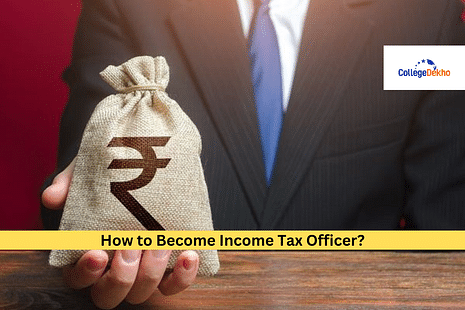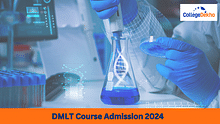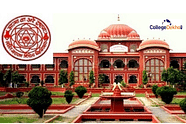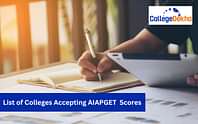- Eligibility Criteria to Become Income Tax Officer
- Physical Fitness to Become Income Tax Officer
- Qualifications Required for an Income Tax Officer
- Recruitment Process for an Income Tax Officer
- Types of Income Tax Officers
- Duties or Job Responsibilities of Income Tax Officer
- Exams for Income Tax Officers
- Skills of Income Tax Officer
- How to Become Income Tax Officer
- Salary & Perks of Income Tax Officer
- Career Growth of an Income Tax Officer
- Faqs

A job in the Income Tax Department as an Income Tax Officer (ITO) is considered a very respectable profession in India. If you ever wonder how to become Income Tax Officer, the possible criteria, the selection process, etc., you need to give this article a read. Many students dream of becoming officera and working under the government. These officers are accountable for undertaking direct tax collection for the government.
If you are wondering how to make a career as an Income Tax Officer and the possible responsibilities that these officers have to carry out on a day-to-day basis, you have to follow this piece. The Income Tax Officers have to deal with income taxes of the Central Board of Direct Taxes and are solely responsible for the assessment and investigation of income tax. While assessing the financial documents, the officials make sure that businesses and individuals pay the correct taxes to the government of India.
This article will help you to get insights on how to become Income Tax Inspector and also find out how to get the officer role through SSC CGL (Staff Selection Commission Combined Graduate Level) and UPSC (Union Public Service Commission).
As officers, you have to work for the Income Tax Department which comes under the central government. As a central government agency, the IT Department directly collects the tax for the government and monitors them. This department is formed to keep a check on the citizens, businesses and organizations if they are paying taxes on time. The direct taxation acts that are passed by the Indian Parliament should be administered by the Income Tax Department.
Eligibility Criteria to Become Income Tax Officer
For those thinking what should be the eligibility requirements, must know that the age limit for different categories of students should be followed. The reserved category students get relaxation. Follow the table below to understand the criteria of an officer:
Category of the Student | Age Criteria |
|---|---|
General Category | 18 to 30 years |
OBC Category | 18 to 33 years |
SC/ ST Category | 18 to 35 years |
Ex-servicemen | 18 to 38 years |
Physically handicapped | 18 to 40 years |
Not only do you have to keep in mind the age limit but, you also need to follow the citizenship requirements to do a Central Government job in India. Check here the requirements for the role:
- Citizens of India
- Citizens of Nepal
- Citizens of Bhutan
- A Tibetan refugee who came to India before January 1, 1962, planning to settle in India permanently.
- A person of Indian origin who has shifted to India permanently from Sri Lanka, Pakistan, Burma, Kenya, Uganda, Tanzania, Zambia, Ethiopia, Malawi, Zaire or Vietnam.
- Candidates who are not of Indian nationality would need an eligibility certificate issued by the government of India.
Physical Fitness to Become Income Tax Officer
There are some physical standards that you have to meet as set by the IT Department to become eligible for the officer post. The physical requirements are however different for male and female candidates. The minimum requirement for fitness for male and female candidates for Tax Inspector role are discussed below:
Male Candidate: Height (157.5 cm) and Chest (81 cm, fully expanded with a minimum expansion of 5 cm). The Physical Test for male candidates includes walking (1600 m in 15 mins) and cycling (8 km in 30 mins)
Female Candidate: Minimum height (152 cm) and Weight (48 kg). The Physical Test for female candidates includes walking (1 km in 20 mins) and cycling (3 km in 25 mins).
Qualifications Required for an Income Tax Officer
Candidates should be aware of the fact that a Bachelor’s degree is a must to appear for the government test that is conducted to select candidates for the post of Income Tax Officer. If you want to become eligible to sit for the SSC CGL or the UPSC Civil Service exam, you should have an undergraduate/ Bachelor’s degree in any discipline from a recognized university. Educational qualification to become an officer in the IT department should be kept in mind by all the aspirants.
Recruitment Process for an Income Tax Officer
The recruitment process for an officer post includes a Written Examination, Interview and Training in case you are pondering how to become a Tax Inspector. SSC CGL and UPSC Civil Service exams are conducted by the central government to choose candidates for different officer posts in the tax department. We will discuss here the recruitment process in detail.
Written Examination
Through SSC CGL, candidates are recruited for different Group B and Group C posts that include Income Tax Department. The Civil Services assessment in India is conducted by the UPSC to recruit candidates for various government positions, including the Indian Revenue Service (IRS). Through UPSC Civil Service, you can become an Income Tax Officer if you choose the Indian Revenue Service (Income Tax) to fulfil your dream.
The Staff Selection Commission Combined Graduate Level conducts the written assessment in two phases where Phase I is the preliminary stage and in Phase II, they have to mandatorily appear for Paper 1 and Paper 3 to become an Income Tax Officer. Previously, there was one more Phase for descriptive writing which has now been omitted for Group B and C posts. A computer typing test has been introduced after the completion of Phase II.
The written test for the UPSC Civil Services is done in two stages, Phase I is the Prelims and Phase II is the Mains. Those who will clear Phase I need to fill up a form to appear for the Phase II round.
Interview
The Interview round is mandatory for the recruitment process in both assessments. The final stage of the selection process is the Interview round where shortlisted candidates are interviewed to evaluate their suitability for the above mentioned role. Candidates who have passed the Mains, have to appear for the personal interview round which tests your mental and personality abilities to become Income Tax Officer.
Training
If you are pointing down the essentials of how to get the officer role, you must understand that not only do you have to pass the written test and the interview round, but you also have to go through training. The training session that successful candidates undergo after their final selection is aimed at preparing them with the necessary skills and knowledge to perform their duties effectively. The candidates who will clear the SSC CGL examination have to undergo a 12-week training process at the Direct Taxes Regional Training Institute (DTRTI). On the other hand, those clearing the Union Public Service Commission will have to undergo training at the National Academy of Direct Taxes (NADT) or other designated training institutions. During the training session, the officers are taught various elements of tax laws, assessment procedures, audit techniques, legal aspects, etc.
Types of Income Tax Officers
People who are wondering which type of tax officer they want to become can read here the different types of role:
Assistant Commissioner of Income Tax: As an Assistant Commissioner, the officer is responsible for taking into consideration judicial matters under Chapter 20 and Section 288 of the Income Tax Act of 1961. The Assistant Commissioner of Income Tax looks after the expenditure tax, wealth tax, estate duty and benami transaction act.
Deputy Commissioner of Income Tax: This post is a very important and the responsibilities include checking the registers in Income Tax offices for audit purposes.
Joint Commissioner of Income Tax: The Joint Commissioner works in association with the customs, central excise and revenue intelligence departments.
Commissioner of Income Tax: The Income Tax Commissioner manages the interest of revenue and is involved in the internal audits in the assessment of income and levy of tax.
Chief Commissioner of Income Tax: As a Chief Commissioner, you will be responsible for inspecting confidential reports of officials working in a particular region and also those who work directly under you. They controls budget and expenditure and evaluates immovable property returns.
Duties or Job Responsibilities of Income Tax Officer
Before becoming an officer you must know the duties that you have to perform after to get the job. You basically have to work in the Income Tax department and contribute to gathering the revenue for public welfare and running government institutions that maintain tax accounts. Your primary goal should be to become a tax officer but also understand the duties and responsibilities that an officer has to do and see if you are willing to do all the work. The role of an Income Tax Officer are:
- To ensure that businesses and citizens of India are paying their taxes to the government.
- Determining the actual income of the citizens based on the income tax return that they have filed.
- Assisting with revenue collection for public welfare and managing government institutions by maintaining tax accounts of different departments.
- You need to analyse court reports for the status of mortgages, claims and financial reports or investigate the person who does not pay taxes through a 3rd party.
- Executing raids on organisations or people that provided false income tax returns (ITR) or did not file an ITR.
- These officers look into the declarations of failure to pay taxes.
- Making frequent checks or sending a notice for fraud or other unlawful acts.
Exams for Income Tax Officers
If you have completed your Class 12th and wondering how to become a Tax Officer, then you have to appear for either the SSC CGL or the UPSC Civil Service. Read in detail about the exams below and choose the one suitable for you.
SSC CGL Income Tax Officer Exam
Here, we will be discussing how to become a tax officer through the SSC CGL. The SSC CGL exam is conducted in 3 steps, Tier I, Tier II and Physical Test.
SSC CGL Eligibility Criteria
The minimum age limit to appear for the test is 18 years and the upper age limit for the General category candidates has been increased to 30 years. For the OBC category candidates, 3 years of relaxation is given, SC/ ST aspirants get 5 years of relaxation and PWD (Persons with Benchmark Disabilities) get 10 to 15 years and Ex-servicemen get a relaxation of 3 years. Aspirants should follow the SSC CGL eligibility criteria to appear for the exam. Physical fitness as discussed earlier should be kept in mind.
SSC CGL Exam
To appear for the SSC CGL examination, aspirants have to fill up the application form. Male candidates belonging to the General category need to pay Rs. 100 to fill up the application form while female candidates and those belonging to SC, ST, PWD and Ex-servicemen categories do not need to pay an application fee.
Tier I Exam
The SSC CGL Tier I exam is basically the Prelims which is conducted online (computer-based test) and the question paper will be objective multiple choice questions. The sections covered under Tier I are English Comprehension, General Awareness, General Intelligence and Reasoning and Quantitative Aptitude. After clearing Tier I, eligible candidates can appear for the Tier II exam.
Tier II Exam
The Tier II Exam is conducted in three phases, where Paper I is compulsory for all candidates, Paper II for Junior Statistical Officer (JSO) and Paper III is for Assistant Audit Officer/ Assistant Accounts Officer. Paper I comprises Mathematical Abilities, Reasoning and General Intelligence, English Language and Comprehension, General Awareness, Computer Knowledge Test and Data Entry Speed Test. For the officer role in the IT department, candidates have to take Paper III consisting of General Studies (Finance and Economics).
Physical Test
For the physical test round, candidates who have cleared Tier I and Tier II will be called for a physical test and a medical fitness examination. After the test is over, candidates have to verify their documents. Once they have passed the physical test, they are now hired in the Tax department.
UPSC Income Tax Officer Exam
The UPSC Civil Service examination is conducted in three phases every year to choose eligible candidates for the tax officer role.
UPSC Civil Service Eligibility Criteria
Read here to know the following eligibility criteria to appear for Union Public Service Commission. Getting a bachelor’s degree is a must. The minimum and maximum age limits to apply for the officer post are 21 and 30 years respectively. However, candidates belonging to the OBC category get 3 years of relaxation, for SC/ ST, it is 5 years, PWDb (Persons with Benchmark Disabilities) get 10 to 15 years and Ex-servicemen get a relaxation of 3 years.
UPSC Civil Service Examination
The 3 phases of the UPSC exam include Phase I Preliminary, Phase II Mains and Phase III is the Personal Interview or the Personality Test.
Phase I
The first stage of the UPSC Civil Services also known as the preliminary exam consists of two papers each for 200 marks. These two papers are of objective type and the time set for each paper is a maximum of 2 hours. Visually impaired students are provided with extra 20 minutes for each paper. The question paper will be provided in both English and Hindi. Students have to keep in mind that for English comprehension, no Hindi interpretation will be provided.
Phase II
Candidates who are interested to appear for the Mains assessment have to fill up a form. Those who have cleared the prelims round, need to fill out the UPSC DAF form to appear for Mains (Phase II). Aspirants have to fill out the DAF form and upload it on the official website of UPSC.
The Union Public Service Commission Phase II is the Mains exam. This is subjective in nature and is conducted in different stages. This test consists of 9 papers in total and to become eligible for the next round, candidates need to clear each and every paper in this phase. Once you have cleared this phase, you will be selected for Phase II on the basis of the merit list.
Phase III
Phase III is the Personality Test or Interview round and this is the final stage of the exam. The interview round is organised by the UPSC board to check if you are suitable for a civil service career and other responsibilities. In the interview round, candidates are required to answer questions of general interest and are examined based on their mental and social characteristics. The Commission conducts a Personality Test of 275 marks.
If you are wondering how to become an Income Tax Inspector, you need to have the desired skills to clear the interview round. The Union Public Service Commission interview panel consists of bureaucrats, subject matter experts, psychologists, educationists and the board chairperson to conduct the personality test. Candidates will be checked for the following qualities such as communication skills, mental alertness, clear and logical presentation, attitude, critical powers of assimilation, a balance of judgement, depth of interest, the ability for leadership and intellectual and moral virtue.
The final selection will be done based on the marks obtained in the Mains examination and Interview and the final rank provided to the eligible candidates.
Skills of Income Tax Officer
The skills for an Income Tax Officer can be found here for those who are interested to make a career in this department. Every job has its own set of skills and candidates possessing those particular skills are only hired for the job. The skills required can be divided into soft skills and hard skills.
The soft skills that you must possess are attention to detail, communication skills, time management, problem-solving skills and numeracy skills. Discussed in detail are some of the soft skills.
Communication Skills: As an officer, you must have good communication skills as you have to interact with businesses, accountants, solicitors and coworkers.
Attention to detail: The officers should pay attention to detail while researching, surveying, correcting and evaluating income tax during their daily work.
Problem-solving Skills: With good problem-solving skills, officers can examine claims for those incapable of paying taxes or for other tax-related problems.
Time Management Skills: These officers have to work for long hours, especially during the closing of the fiscal year so as to ensure that taxpayers file correct ITRs and there is no asset hiding or fraud.
The various hard skills that an individual need are Data Entry, Tax Audits, Escrow Accounts, Revenue Service, etc.
How to Become Income Tax Officer
It is not so easy to become an Income Tax Officer in India. There are certain steps that you need to complete in order to achieve your dream of becoming an Income Tax Officer. The step-by-step process to become an officer has been discussed below.
- People aspiring for officer posts need to first enrol themselves on an undergraduate course. Without completing your bachelor’s degree from a recognized university, you cannot appear for any of the tests.
- You can choose to appear for Staff Selection Commission. You have to check the eligibility criteria first and then fill up the application form for the post. With dedication and hard work, you can clear the 2 rounds and the computer typing test for the SSC CGL exam.
- The UPSC test is the Civil Service Examination which is considered a tough competitive exam. After clearing the Prelims and the Mains round, candidates have to appear for the Interview round which is the final round of the selection process.
- You have to clear the Interview round. The interview panel might ask some tricky questions which you have to answer confidently. Prepare yourself for the Interview round as many candidates cannot clear this round.
- Once you have been selected as an officer in the IT department, you have to undergo a training program.
Salary & Perks of Income Tax Officer
The salary of an officer comes with various perks and benefits, they get a fixed salary package and earn some special allowances.
Salary of Income Tax Officer
The starting salary of an Income Tax Officer in India is around Rs. 44,900 along with a grade pay that ranges between Rs. 4,000 to 5,500. Let us understand the basic salary structure of an officer:
Category | Salary Structure |
|---|---|
Basic Pay | Rs. 44,900 |
HRA | Rs. 10,776 |
TA | Rs. 3,600 |
DA | Rs. 7,633 |
DA on TA | Rs. 612 |
NPS Deduction 10% (Basic + DA) | Rs. 5,253 |
Gross Earnings | Rs. 67,521 |
CGEIS | Rs. 30 |
CGHS | Rs. 350 |
Government Contribution | Rs. 7,355 |
Total Deduction | Rs. 5,633 |
Total Salary | Rs. 61,888 |
You got to understand from the aforementioned table the salary structure of an Income Tax Officer. Get to understand the pay scales for different posts in the Income Tax Department that have been categorized for the Indian Revenue Service.
Cadre 2 Designation | Payscale |
|---|---|
Principal Chief Commissioner of Income Tax | Rs. 80,000 (fixed) |
Chief Commissioner | Rs. 75,500-80,000 |
Principal Commissioner of Income Tax | Rs. 67,000-79,000 |
Commissioner of Income Tax | Rs. 37,400-67,000 + grade pay of Rs. 10,000 |
Additional/ Joint Commissioner of Income Tax | Rs. 37,400-67,000 + grade pay of Rs. 8,700/ Rs. 15,600-39,100 + grade pay of Rs. 7,600 |
Deputy Commissioner | Rs. 15,600-39,100 + grade pay of Rs. 6,600 |
Assistant Commissioner of Income Tax | Rs. 15,600-39,100 + grade pay of Rs. 5,400 |
Reserves (Group ‘A’) | Rs. 15,600-39,100 + grade pay of Rs. 5,400 |
Perks of Income Tax Officer
From the above section, you have understood the salary structure of an Income Tax Officer. Along with the fixed salary, the officers enjoy additional perks that have been discussed below:
Central Government Health Scheme (CGHS): This is a special health scheme for central government employees. The officers are provided medical facilities through Wellness Centres/ polyclinics under Allopathic, Ayurveda, Yoga, Unani, Sidha and Homeopathic systems of medicines.
House Rent Allowance (HRA): It is a part of the salary provided by the Government of India (GoI) for the expenditures incurred for renting accommodation.
Transport Allowance (TA): The GoI pays a fixed amount to the employees for travel related to the work.
Central Government Employees Group Insurance Scheme (CGEGIS): This is a scheme provided by Central Government that provides 2 benefits:
- Insurance cover to help their families.
- Some payment to boost their resources on retirement.
Dearness Allowance (DA): It is a part of salary which is equal to some fixed percentage of the basic salary that helps to restrain the effect of inflation.
Pensions: It is a regular payment made by the authority/ Ministry to people of or above the official retirement age and to some widows and disabled people.
Gross Earnings: The gross earnings are the total amount earned by an officer before any deductions.
Deductions: Certain deductions, such as income tax, provident fund, and other applicable deductions, are subtracted from the gross earnings to arrive at the total salary.
Career Growth of an Income Tax Officer
There is definitely a career growth opportunity for Income Tax Officers if they clear departmental exams. Through the career growth opportunities available to Income Tax Officers, they can get promotions to higher ranks or postings in specialized departments within the IT Department. The officer at least has to work for 5-8 years to get promoted to higher positions.
The various job profiles that they can get in the IT department are as follows:
- Tax Inspector
- Assistant Commissioner
- Deputy Commissioner
- Joint Commissioner of Income Tax
- Income Tax Commissioner
- Additional Commissioner of Income Tax
- Excise Inspector
- Sales Tax Commissioner
- Assistant Commissioner GST
- Chief Commissioner
In case of any queries, write to us through the QnA Zone or call on the toll-free student helpline number 1800-572-9877. For more such information and updates, stay tuned to CollegeDekho !

















Similar Articles
Check Out Off-Campus Colleges in DU: Courses and Highest Cut-Off
Gujarat University B.Com Admission 2024: Check Application, Dates, Specialization, Selection Process here
Upcoming Bank Exams 2024: Full List, Dates, Calendar, Notification
Gujarat M.Com Admission 2024: Application Form, Dates, Eligibility, Selection Process, Top Colleges
Mumbai University M.Com Admission 2024: Application, Eligibility, Selection
How to Become a CA?